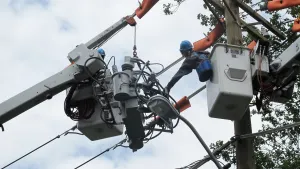More Stories
Gov. Ned Lamont said Wednesday that four ballot fraud arrests in Bridgeport – plus a new election reform law he just signed – should curb absentee ballot abuses.
But critics believe the new law will do little to fix what they call a broken system.
FOUR CHARGED
In the Park City, ballot fraud accusations go back decades. But no one has ever faced prosecution – until now.
On Tuesday, four campaign operatives were charged with unlawful possession of absentee ballots, witness tampering and other election law violations related to the 2019 mayoral race.
The state’s top election official thinks the arrests will deter others.
“I believe the existing deterrents under the law are quite significant – up to $5,000, five years in jail,” said Secretary of the State Stephanie Thomas.
Bridgeport Democratic Town Committee Vice Chair Wanda Geter-Pataky, City Council member Alfredo Castillo and two campaign workers were all arrested. Prosecutors are also considering additional charges against Geter-Pataky for her role in a ballot stuffing scandal that led a judge to overturn the 2023 mayoral primary.
READ THE CHARGES:
NEW ELECTION LAW
Just hours after the arrests, Lamont signed a new election reform law. Among other changes, it speeds up criminal investigations.
“I think the answer to that election fraud is, why the heck did it take three-and-a-half years for [State Elections Enforcement Commission] to refer this to the state’s attorney's office?” he said.
Now, SEEC only has 90 days to refer cases to prosecutors. In addition, more violations are now considered “voting crimes.” Campaigns will have less time to hand out mass batches of absentee ballots, and every absentee drop box in the state must now have a live, publicly-viewable camera.
But is all of that enough to stop ballot abuse? Republicans say no.
“We put safeguards in place – tried to put safeguards in place – which would have required a copy of identification for absentee ballot applications, would have prevented the unsolicited ballot applications from being sent out,” said state Sen. Stephen Harding (R-Brookfield), the Connecticut Senate GOP leader.
Some groups want to ban campaigns from handling absentee ballots altogether, but Thomas is worried about disenfranchising low-income voters.
“People who don’t have a printer at home because you also would need to print it out,” she said. “You would also need to purchase a stamp and get to the post office.”
A bill that that didn’t pass this year would have allowed the state to take over Bridgeport’s elections. Thomas said lawmakers are likely to consider it again in 2025.
“SHE SHOULD STEP DOWN”
Following her arrest, Lamont called on Geter-Pataky to step down – or be removed – from her Democratic Party leadership post. But he also indicated he would not personally intervene.
Lamont: “I think she should step down.”
News 12 Connecticut’s John Craven: "If she won’t step down, should the Democratic Party remove her?”
Lamont: “I would think so.”
Craven: “Are you going to ask them to do that?”
Lamont: “Hope they do the right thing.”
Geter-Pataky’s is unlikely to resign. On Tuesday, her husband maintained her innocence.
“She doesn’t break the law,” said Bryan Pataky. “This is political. This is from sore losers that couldn't function within the system. They were allowed to do the same thing, and they just didn’t have the manpower and the experience behind it.”
All four suspects will be arraigned on June 24 at Bridgeport Superior Court.
ELECTION SECURITY DRILL
Lamont made the comments during a statewide election security drill at the state Emergency Operations Center in Hartford. Local election officials from 147 communities joined Connecticut State Police, the FBI and various state agencies to play out scenarios ranging from an online disinformation campaign and a natural disaster to finding white powder at a polling place.
"We considered everything from physical security at a polling location to cyber security issues,” said Brenda Bergeron, the deputy commissioner of the Connecticut Department of Emergency Services and Public Protection.
In Connecticut, voting machines are not connected to the internet, but Tuesday’s drill looked at what would happen if the state’s Centralized Voter Registration System went down.
More from News 12

LIVE UPDATES: Over a foot of snow falls in Connecticut, officials advise people stay off roads
3:00

More snow possible after record-breaking blizzard: eyes on 2 storms late this week
1:22

Blizzard of 2026 is now a "bomb cyclone"

Your Connecticut 2026 Winter Storm Photos

TIMELINE: When to expect the worst of the blizzard
